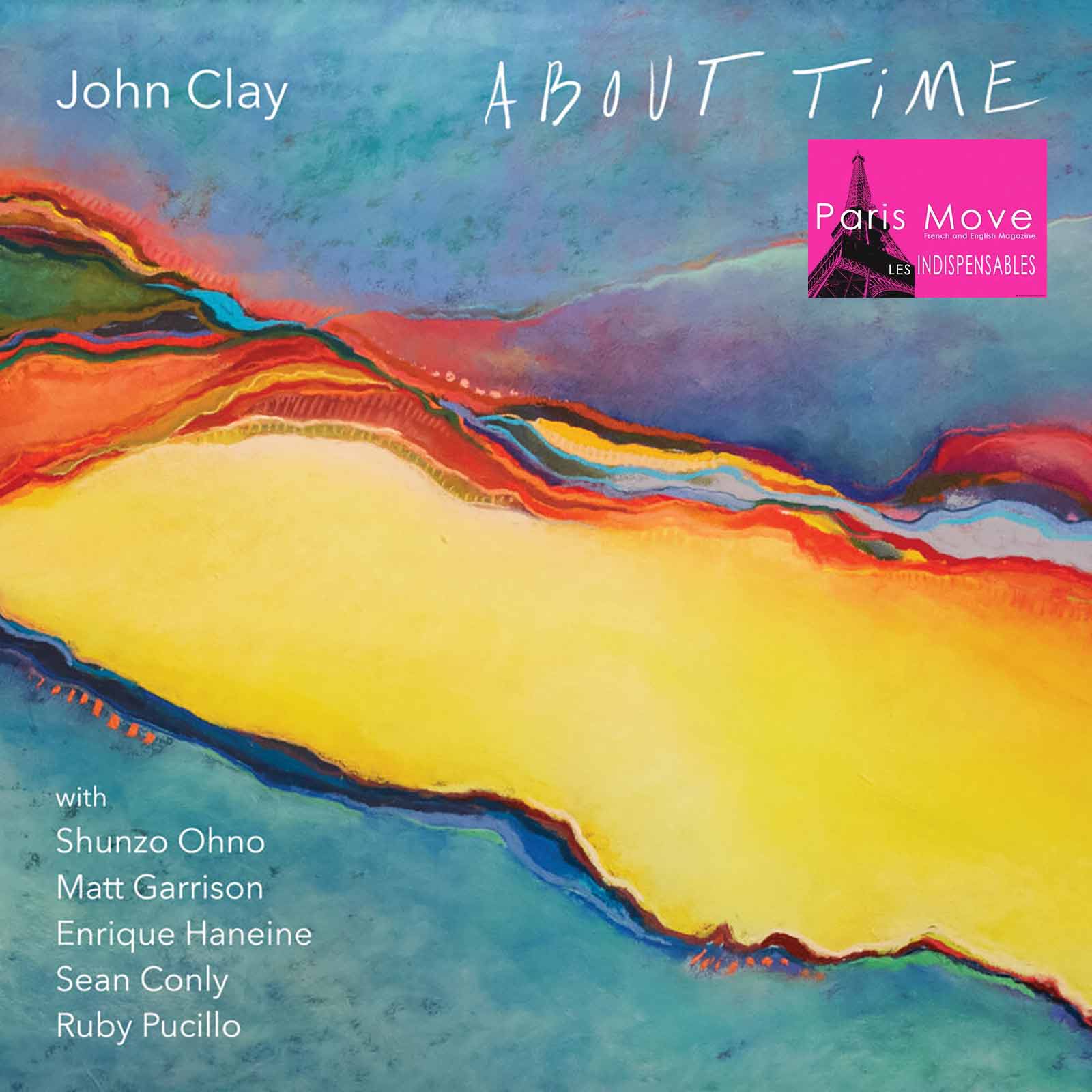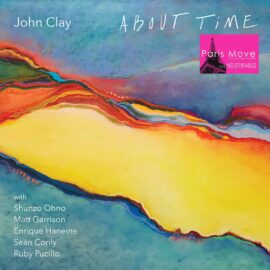| Jazz |

There are albums that arrive quietly, almost modestly, asking only to be heard. And then there are those that sweep in with the assurance of a lived history, the kind of recordings that feel less like new releases than like rediscovered chapters of an ongoing musical conversation. About Time, the latest project initiated by drummer John Clay, himself a veteran of countless stages and late-night sessions, is very much the latter. It shines with a kind of post-bop radiance, polished yet unvarnished, like brass burnished by decades of hands.
Clay is one of those musicians whose résumé reads as a migration map through the jazz lineage. To say he has played with Jimmy Raney, Michael Moore, Chuck Israel, Dennis Irwin, Jimmy Rowles, Don Friedman, Steve Kuhn, Teddy Wilson, Jaki Byard, Harold Mabern, or Steve Adelson is merely to begin. His collaborations extend to Bernie Williams, Gil Parris, Tim Armacost, David Janeway, Sarah Cion, Harvie S, Will Lee, Mike Stern, Steve LaSpina, Guilherme Franco, Don Alias, Gerry Niewood, Billy Martin, Lew Soloff, Nelson Rangell, Cliff Korman, Enrique Haneine, and many more whose names orbit the constellations of modern jazz. These are not just credits; they are proof of a musician who has listened deeply, adapted fluidly, and contributed quietly to multiple eras of the music.
So when About Time unfurls, it does so with the warmth and grain of New York’s club culture embedded in every bar. You can hear it in the airiness of the cymbals, in the conversational phrasing between instruments, in the faint illusion that somewhere, just off-mic, glasses are clinking and someone whispers, “listen to this.” And then there is the voice of Ruby Pucillo, supple, measured, luminous in the low register, almost winged in the upper one. Hers is the kind of presence that elevates an ensemble, not by dominating it but by illuminating it from within. If the album needed a final brushstroke of conviction, she provides it effortlessly.
What is striking from the outset is that About Time contains not a single original composition. In an age where originality is often confused with novelty, Clay makes a different argument: that interpretation—thoughtful, sophisticated, deeply lived, can be just as daring. The album’s wealth lies in its arrangements, in the artistry of its performers, and in the discerning choice of repertoire. The project opens with a shimmering Fred Hersch piece, a delicately balanced blend of introspection and propulsion that sets the emotional architecture of the album. Wayne Shorter, Billy Drummond, Alan Pasqua, and Chick Corea follow, not as museum pieces but as living texts through which Clay’s ensemble speaks with clarity and affection.
The seed for the album was planted during a series of recent performances with pianist Enrique Haneine, whose spontaneous and captivating interplay left a lasting imprint on Clay. “I wanted to immortalize our musical conversations,” Clay explains. “Playing with Enrique has given me some of the most beautiful musical moments of my life.” It’s not hard to imagine these moments: lines tumbling into each other, harmonies opening like windows, rhythmic ideas exchanged with the intimacy of late-night confidences.
But as Clay began shaping the album, choosing the compositions, sketching the contours, listening for its emotional logic, the project expanded. What began as a trio vision grew into something broader, more textural, more ambitious. Horns entered the frame, as did voices. Clay sought musicians whose sensibilities were not merely compatible but resonant, as if they had been destined to sound together.
He found bassist Sean Conly after hearing him perform with drummer Richie Morales. Conly struck him immediately: grounded yet melodically adventurous, able to pivot from classic straight-ahead jazz to boundary-pushing avant-garde explorations without losing coherence. His bass lines do not just hold the ensemble; they animate it, curving beneath the melodies like an underlying current.
Then there is Shunzo Ohno, the trumpeter whose career includes formidable associations with Art Blakey, Herbie Hancock, Wayne Shorter, Gil Evans, and Buster Williams. Ohno brings a kind of charged calm to the recording, a paradoxical mixture of fire and restraint. His phrasing carries the imprint of a musician who has internalized several eras of the music and distilled them into a sound at once nuanced, authentic, and emotionally direct.
Saxophonist Matt Garrison, equally at home on tenor and soprano, is one of those players whose maturity radiates through every note. His tone, full-bodied, unhurried, shaped with the precision of a calligrapher, brings a melodic clarity that feels less like improvisation and more like a quietly unfolding narrative.
Throughout About Time, you can sense what each musician has brought to the project: fragments of personal histories, echoes of former mentors, whole sections of jazz’s unwritten chronicle. The interplay feels lived-in, like a band that has been performing together for years rather than convening for a single recording. A track like “Dubai,” with its intricate architecture and rhythmic complexity, stands as a testament to the ensemble’s discipline and inventiveness. The piece doesn’t merely impress; it invites admiration for the labor behind it, for the hours of listening, practicing, and refining that shape such a performance.
The sound design itself deserves mention. There is a tactile quality to the recording, an intimacy in the room tone, a spaciousness in the stereo field, that renders the music both immediate and atmospheric. The drums are warm without being soft, the horns vivid without becoming intrusive, and the piano’s attack carries just enough percussive bite to keep the edges honest.
About Time is, in many respects, a demanding album, demanding of its musicians and rewarding for its listeners. It is an album that rewards attention rather than multitasking, an album that asks you to sit with it, to inhabit its moods, to follow its subtle turns. For passionate listeners, those who savor nuance, who value arrangement as much as improvisation, it offers a feast of detail and a level of craftsmanship that feels increasingly rare.
It is not common to praise an album composed entirely of non-original material. But here, the absence of originals becomes a strength, not a limitation. Clay and his collaborators treat each composition not as a relic to be preserved but as a living entity to be reimagined. The result is a recording that feels both respectful and boldly creative, both grounded in tradition and unmistakably contemporary.
And perhaps that is the album’s quiet triumph. About Time is not only a celebration of the composers it honors but a testament to John Clay’s career, one built on sensitivity, precision, curiosity, and an unwavering belief in collective musical dialogue. It feels like a summation, a reflection, and a renewal all at once. A reminder that some artists do their best work not by insisting on being heard, but by listening first, and then offering something luminous in return.
Thierry De Clemensat
Member at Jazz Journalists Association
USA correspondent for Paris-Move and ABS magazine
Editor in chief – Bayou Blue Radio, Bayou Blue News
PARIS-MOVE, November 21st 2025
Follow PARIS-MOVE on X
::::::::::::::::::::::::
Musicians :
John Clay, drums
Shunzo Ohno, trumpet and flugelhorn
Matt Garrison, tenor and soprano saxophone
Enrique Haneine, acoustic piano
Sean Conly, acoustic bass
Ruby Pucillo, vocals (3, 6)
Track Listing
- A Lark (Fred Hersch)
- Humpty Dumpty (Chick Corea)
- Alice In Wonderland (Sammy Fain/ Bob Hilliard)
- Rio (Wayne Shorter)
- Dubai (Billy Drummond)
- Highway 14 (Alan Pasqua)
- Stella By Starlight (Victor Young/ Ned Washington – Arrangement by Shunzo Ohno)
- Prelude to Spring (Improv by Enrique Haneine)
- You Must believe in Spring (Michel Legrand)
- My New Friend Old Friend (Alan Pasqua)

